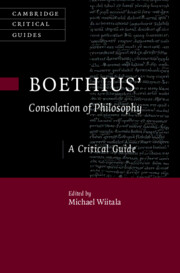Book contents
- Boethius’ Consolation of Philosophy
- Cambridge Critical Guides
- Boethius’ Consolation of Philosophy
- Copyright page
- Contents
- Contributors
- Abbreviations of Boethius’ Works
- Introduction
- Chapter 1 Boethius’ Philosophiae consolatio
- Chapter 2 The Ascent from Π to θ, or On Philosophy’s Teaching a Blind Man to See
- Chapter 3 Lady Philosophy as a Feminine Personification of Wisdom
- Chapter 4 Boethius’ Christianity in the Consolatio
- Chapter 5 The Blending of Pagan and Christian Elements in Book III of the Consolatio
- Chapter 6 The Human Person in the Consolation of Philosophy
- Chapter 7 Self-Investigation, Self-Knowledge, and Inner Conflict in Boethius’ Consolation of Philosophy
- Chapter 8 What It Means to Be a God
- Chapter 9 A Consolation through Philosophical Insight?
- Chapter 10 Being and Existence in the Consolation of Philosophy
- Chapter 11 Circle and Sphere Metaphors for God’s Nature and Providence in Boethius’ Consolation of Philosophy and Dionysius’ On Divine Names
- Chapter 12 Time and Eternity in the Consolation of Philosophy
- Chapter 13 Boethius on Human Freedom and Divine Foreknowledge
- References
- Index
- Cambridge Critical Guides
Chapter 10 - Being and Existence in the Consolation of Philosophy
Published online by Cambridge University Press: 23 May 2024
- Boethius’ Consolation of Philosophy
- Cambridge Critical Guides
- Boethius’ Consolation of Philosophy
- Copyright page
- Contents
- Contributors
- Abbreviations of Boethius’ Works
- Introduction
- Chapter 1 Boethius’ Philosophiae consolatio
- Chapter 2 The Ascent from Π to θ, or On Philosophy’s Teaching a Blind Man to See
- Chapter 3 Lady Philosophy as a Feminine Personification of Wisdom
- Chapter 4 Boethius’ Christianity in the Consolatio
- Chapter 5 The Blending of Pagan and Christian Elements in Book III of the Consolatio
- Chapter 6 The Human Person in the Consolation of Philosophy
- Chapter 7 Self-Investigation, Self-Knowledge, and Inner Conflict in Boethius’ Consolation of Philosophy
- Chapter 8 What It Means to Be a God
- Chapter 9 A Consolation through Philosophical Insight?
- Chapter 10 Being and Existence in the Consolation of Philosophy
- Chapter 11 Circle and Sphere Metaphors for God’s Nature and Providence in Boethius’ Consolation of Philosophy and Dionysius’ On Divine Names
- Chapter 12 Time and Eternity in the Consolation of Philosophy
- Chapter 13 Boethius on Human Freedom and Divine Foreknowledge
- References
- Index
- Cambridge Critical Guides
Summary
This chapter examines the notion of being in the Consolation of Philosophy and contrasts it with modern notions of existence. The notions in the Consolation relevant to this inquiry are those expressed by the verbs esse and exsistere. The chapter argues that the basic notion of exsistere in the Consolation should be understood as “to be manifest,” while the basic notion of esse should be understood as “to be something or other” or “to be intelligible.” Furthermore, the chapter demonstrates that the notion of esse in the Consolation differs from typical modern notions of existence in two significant ways. First, unlike modern notions of existence, according to which there are things that do not exist, the notion of esse or being in the Consolation has no contrary. Everything that can be spoken of or thought about “is” in some way. Second, the notion of esse in the Consolation, as in Aristotle, is “said in many ways.” In this it differs from modern notions of existence, which tend to be univocal. The chapter shows that once the notions of exsistere and esse are properly understood, certain arguments in the Consolation that might initially appear confused turn out to be quite clear and highly plausible.
Keywords
- Type
- Chapter
- Information
- Boethius’ ‘Consolation of Philosophy’A Critical Guide, pp. 169 - 185Publisher: Cambridge University PressPrint publication year: 2024



